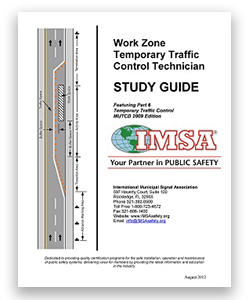
With the ever-changing demands of technology today, it is more important than ever that properly trained and skilled technicians are available. IMSA Certifications indicate individuals have met prerequisite qualifications and passed an examination -- from an impartial, nationally-recognized association -- to determine they are qualified to perform specific technical tasks. Certification also bestows a sense of achievement upon the certified individual since it reflects professional advancement in a chosen field, and can also provide an entry into many job assignments that otherwise would be difficult to obtain, since employers recognize certification as an indication of the individual's ability to do specific job tasks without the need for on-the-job training.
IMSA, working closely with the IMSA Educational Foundation, began certification of individuals involved with various public safety activities in 1982. IMSA has issued over 100,000 certificates in public safety. IMSA is globally recognized as the leader in public safety certifications. (IMSA membership is not a requirement to obtain certification.)
Persons seeking certification must purchase a certification manual for the appropriate program and level and pass a proctored examination. IMSA highly recommends enrollment in a moderated review program but it is not required for certification. Those participants who wish to review the material in a self-study process and challenge the examination may do so (purchase manuals online ). Moderated programs are held at various locations throughout the year, or IMSA will present a program at your location upon request (in order to keep costs low IMSA recommends a minimum class size of 20).
IMSA currently offers certification in the following fields:

Featuring Part 6 Temporary Traffic Control from the latest edition of the MUTCD Edition.
Problems of traffic control occur when traffic must be moved through or around road or street construction, maintenance operations, utility work and incidents on or adjacent to the roadway.
This manual establishes principles to be observed in the design, installation, and the maintenance of traffic control devices and identifies standards where applicable. This study guide was also developed to be used as a reference. The general principles outlined in this manual are applicable to both rural and urban situations.
This course on Work Zone Temporary Traffic Control was specifically developed by the principles and procedures which experience has shown to enhance the safety of motorists and the workers in the vicinity of work areas.
Printed in full color on a high quality paper, this manual comes in a sturdy 3-ring binder with tabs for easy reference.
Prerequisites:
None
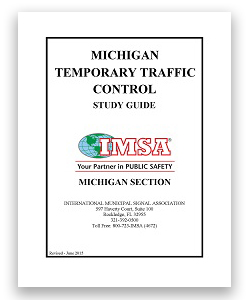
The MMTC certification program is designed for persons who will be assigned Traffic Regulator duties, lead workers, supervisors that will install and review traffic regulator operations and engineering staff;that will develop temporary traffic control. This program is designed to exceed the Michigan DOT requirements to be a Traffic Regulator. MTTC deals specifically with the requirements of the 2009 Manual on Uniform Traffic Control Devices, Part 6, the MMUTCD and the authority, obligation and training of Traffic Regulators. The MTTC program promotes the proper use of traffic control devices, traffic control procedures, MiOSHA requirements, safety apparel and general traffic safety. This program highlights requirements for signing, special Traffic Regulator operations, including single and intermediate Traffic Regulator, Haul Road operations and the use of police officers.
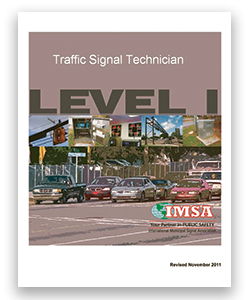
Traffic Signal Technician Level I Certification indicates that the holder is familiar with the concepts and terminology associated with signalized traffic control devices and systems. The content is designed for the entry-level technician that has had some prior training or experience in electrical technology. Work site safety is a primary skill area, having been covered in Work Zone Temporary Traffic Control Technician and also in this coursework. Principals of operation and the primary electrical details of cabinet wiring and components have been introduced. Equipment, methods, and materials of signal system construction have been reviewed. The basics of traffic signal design, maintenance, and legal issues have been explained and discussed. This certification holder is prepared to make a contribution on any traffic signal crew, whether involved in construction, maintenance, or design preparation with proper supervision and guidance. This certification also provides the required background information that will allow the technician to learn the material taught in the four Level II certification courses.
Prerequisites:
IMSA Work Zone Temporary Traffic Control Technician Certification or equivalent as approved by the IMSA Education & Certification Manager.
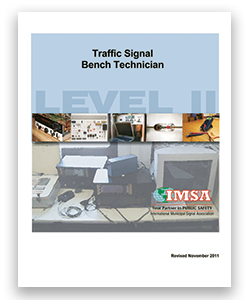
The Traffic Signal Bench Level II Certification indicates the holder has a well-rounded background in traffic signal technology from coursework and experience. The Level II Bench certification indicates the technician has additional training on traffic signal control cabinet equipment. This training includes the programming, application, and maintenance of controllers, conflict monitors, vehicle and pedestrian detection systems, and the communication and power wiring of the cabinet. The technician is also trained in electronic circuit operation and fault diagnosis, and the use of test equipment for diagnosis and certification of control cabinet equipment. The certification holder is prepared to make a substantial contribution in the signal maintenance operation of either a private firm or a public agency by preparing signal cabinets for deployment and/or troubleshooting and repairing cabinet components that are brought in from the field.
Prerequisites:
IMSA Work Zone Temporary Traffic Control Technician Certification or equivalent as approved by the IMSA Education & Certification Manager.
IMSA Traffic Signal Technician Level I Certification
Two (2) years experience in the Traffic Signal Field
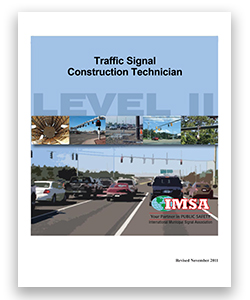
The Traffic Signal Construction Level II Certification indicates the holder has a well-rounded background in traffic signal technology from course work and experience. The Level II Construction certification indicates the technician has additional training on traffic signal control system construction, safety, materials, methods, and equipment. Activities covered include: safe operation of construction equipment (from concrete saws to cranes), planning activities, documentation, and installation of conduits, poles, mast arms, signal heads, cabinets, and inductive loops. Setup and testing of a new signal installation is also reviewed. The certification holder is prepared to make a substantial contribution in the traffic signal construction group of a private firm or a public agency where new or replacement traffic signal construction is the focus.
Prerequisites:
IMSA Work Zone Temporary Traffic Control Technician Certification or equivalent as approved by the IMSA Education & Certification Manager.
IMSA Traffic Signal Technician Level I Certification
Two (2) years experience in the Traffic Signal Field
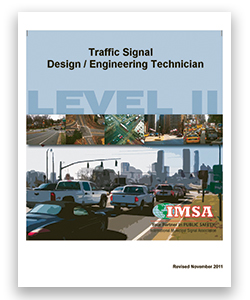
The Traffic Signal Design/Engineering Level II Certification indicates the holder has a well-rounded background in traffic signal technology from coursework and experience. The Level II Engineering certification indicates the technician has additional training on traffic signal control system planning, design, theory of operation, and legal/regulatory issues. Areas of training include industry standards, liability and regulatory considerations, traffic data collection, site inspections (prior to signal design), detection design, intersection phasing and timing plans, volume density and coordination timing, equipment selection, and project management. The certification holder is prepared to make a substantial contribution in the design of signalized intersections, whether employed by a private firm or a public agency, where new or replacement traffic signal planning and design is the focus.
Copyright 2011
Prerequisites:
IMSA Work Zone Temporary Traffic Control Technician Certification or equivalent as approved by the IMSA Education & Certification Manager.
IMSA Traffic Signal Technician Level I Certification
Two (2) years experience in the Traffic Signal Field
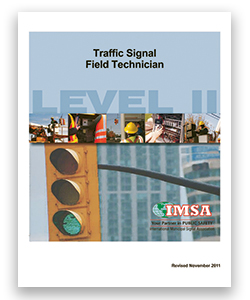
The Traffic Signal Field Level II Certification indicates the holder has a well-rounded background in traffic signal technology from coursework and experience. The Level II Field certification indicates the technician has additional training on traffic signal control system troubleshooting, on-site repairs, and maintenance methods and equipment. Areas of training include worksite safety, maintenance of traffic, traffic signal system equipment standards and operation, installation inspection, troubleshooting, equipment repair, replacement and programming, test equipment, signal phasing and timing, detection, system communications, preventive maintenance, and documentation. The certification holder is prepared to make a substantial contribution in the maintenance and repair of signalized intersections, whether employed by a private firm or a public agency.
Prerequisites:
IMSA Work Zone Temporary Traffic Control Technician Certification or equivalent as approved by the IMSA Education & Certification Manager.
IMSA Traffic Signal Technician Level I Certification
Two (2) years experience in the Traffic Signal Field
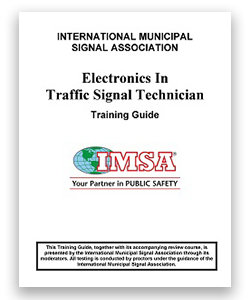
The Electronics in Traffic Signal Technician study guide covers the following basic principles:
Prerequisites:
None
Prerequisites:
None
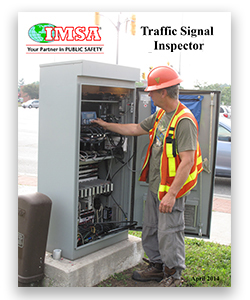
The IMSA Traffic Signal Inspector Certification Program is designed to ensure public safety by helping individuals to understand fundamental concepts associated with the inspection for construction of traffic signal installations. Traffic Signals are a key element in our transportation system and the proper operation of these signals is of paramount importance in maintaining reasonable levels of mobility. Knowledgeable traffic signal inspection is required to ensure that proper/specified construction practices are followed during signal installation resulting in signals that operate as intended. Knowledgeable inspection is also a key element in limiting the liability exposure of governmental agencies associated with malfunctioning traffic signals.
Traffic Signal Inspector Certification is recommended for all individuals involved in the inspection of traffic signal construction. It is also a valuable course for contractor personnel, since it provides an inspector’s viewpoint of traffic signal construction.
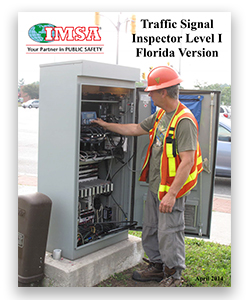
The IMSA Traffic Signal Inspector Certification Program is designed to ensure public safety by helping individuals to understand fundamental concepts associated with the inspection for construction of traffic signal installations. Traffic Signals are a key element in our transportation system and the proper operation of these signals is of paramount importance in maintaining reasonable levels of mobility. Knowledgeable traffic signal inspection is required to ensure that proper/specified construction practices are followed during signal installation resulting in signals that operate as intended. Knowledgeable inspection is also a key element in limiting the liability exposure of governmental agencies associated with malfunctioning traffic signals.
Traffic Signal Inspector Certification is recommended for all individuals involved in the inspection of traffic signal construction. It is also a valuable course for contractor personnel, since it provides an inspector’s viewpoint of traffic signal construction.
Topics covered in the Traffic Signal Inspector Certification Course Manual include:
Introduction to Traffic Signal Inspector
Inspection of Underground Facilities
Inspection of Traffic Signal Supports
Inspection of Overhead Equipment
Inspection of the Vehicular and Pedestrian Detection Systems
Inspection of the Controller Assembly
Safety Requirements
Final Acceptance and Turn-On
Prerequisites:
IMSA Work Zone Traffic Control Safety Certification OR equivalent as approved by the IMSA Education & Certification Manager.
Effective August 1, 2018 IMSA Traffic Signal Technician Level I Certification will be required as a prerequisite for this program.
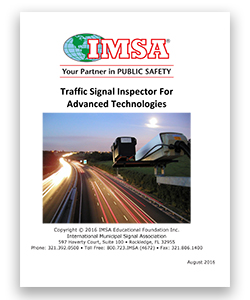
The IMSA Traffic Signal Inspector Advanced Technologies Certification Program builds on knowledge and skills developed in the Traffic Signal Inspector Level I program, and prepares the traffic signal inspector for more challenging and advanced assignments. Material covered in this program includes test equipment, control components, power systems, foundations, intersection wiring, detection systems, Intelligent Transportation System (ITS) devices, and communications.
This program is intended for individuals responsible for the inspection of advanced traffic control and Intelligent Transportation Systems and seek an advanced level of professional certification.
Prerequisites:
IMSA Work Zone Traffic Control Safety Certification OR equivalent as approved by the IMSA Education & Certification Manager, Traffic Signal Inspector
Effective August 1, 2018 IMSA Traffic Signal Technician Level I Certification will be required as a prerequisite for this program.
Traffic Signal Inspector Brochure Download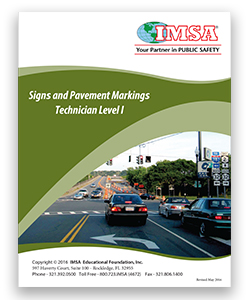
This certification program provides an introduction to the latest technology, materials, and rules and regulations that are used for the installation and maintenance of signs and pavement markings on today’s roadways. Accepted industry standards and practices are covered in detail such as the Manual On Uniform Traffic Control Devices (MUTCD) and how to use it, the various types of signs and pavement markings, and their application and how they interact with one another. Additional subject matter includes tort and risk liability, work zone safety, school zones, bike lanes, equipment maintenance, asset management, visibility and retroreflectivity, and environmental safety. An exam is included at the conclusion of the program which upon passing certification is issued.
This program is intended for those responsible for the installation and maintenance of signs and/or pavement markings on our roadways.
Prerequisites:
Work Zone Temporary Traffic Control Technician Certification or equivalent as approved by the IMSA Education & Certification Manager.
One year of field traffic operations experience.
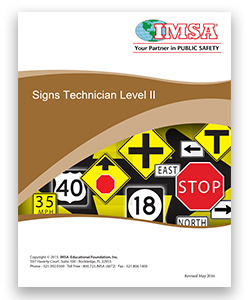
The Signs Technician Level II is an advanced certification program that is designed to build upon the fundamental of the Signs & Markings Level I program. The Level II program covers an advanced level of knowledge and skill sets required specifically for sign design, installation, and maintenance. In this program the sign technician will expand their understanding of the criteria for the application of signs in accordance with the MUTCD and other references. Topics covered are when and where these traffic control devices are installed, how to properly manufacture, install and maintain them. Additional subject matter includes sign requirements for freeways and expressways, speed zones, non-traditional toll managed lanes, guide signs, general and special warning signs, street name signs, route markers and routes signs, and design and location consideration’s. The program also emphasizes the role of and increased responsibility that comes with Level II Signs Technician certification.
This program is intended for those responsible for the installation and maintenance of signs on our roadways and seek an advanced level of professional certification.
Prerequisites:
Work Zone Temporary Traffic Control Technician Certification or equivalent as approved by the IMSA Education & Certification Manager.
Signs and Pavement Markings Technician Level I
Two years of field traffic operations experience.
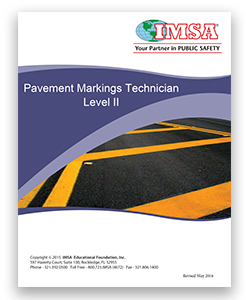
The Pavement Markings Technician Level II is an advanced certification program that is designed to build upon the fundamental of the Signs & Markings Level I program. The Level II program covers an advanced level of knowledge and skill sets required for specifically for pavement marking design, installation, and maintenance. This Level II program will allow the Pavement Markings Technician to garner greater insight and an advanced understanding of pavement marking materials, installation, and maintenance. It will also expand their knowledge of the criteria for the application of pavement markings in accordance with the MUTCD and other references. Topics covered are when and where these traffic control devices are installed, how to properly install and maintain them, material safety, pavement marking visibility, retroreflectivity, freeway and expressway markings, and colors, patterns and widths application standards. An in depth overview of all of the various marking materials and the technology behind them is also provided. The program also emphasizes the role of and increased responsibility that comes with Level II Pavement Markings Technician certification.
This program is intended for those responsible for the installation and maintenance of pavement markings on our roadways and seek an advanced level of professional certification.
Copyright 2016
Prerequisites:
Work Zone Temporary Traffic Control Technician Certification or equivalent as approved by the IMSA Education & Certification Manager,
Signs and Pavement Markings Technician Level I
Two years of field traffic operations experience
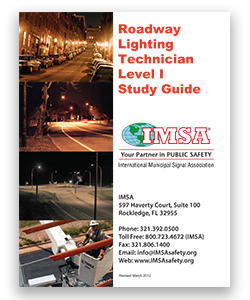
The Roadway Lighting Technician Level I Certification review program for qualified personnel is designed to cover the fundamental knowledge and skill sets required for individuals working on Roadway Lighting. The review material will address electrical safety and codes, basic electricity, laws, jurisdictional requirements and basic construction and maintenance.
Prerequisites:
IMSA Work Zone Traffic Control Safety Certification or equivalent as approved by the IMSA Education & Certification Manager.
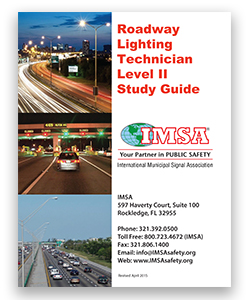
The Roadway Lighting Technician Level II review is an advanced certification program that is designed to build upon the fundamentals of the Roadway Lighting Level I program. The Level II program covers an advanced level of knowledge and skill sets required specifically for roadway lighting design, installation, management and maintenance.
This program is intended for those responsible for the design, installation, management and maintenance of roadway lighting who seek an advanced level of professional certification.
Copyright 2015
Prerequisites:
Work Zone Temporary Traffic Control Technician Certification or equivalent as approved by the IMSA Education & Certification Manager.
Roadway Lighting Technician Level I
Two years of roadway lighting field experience.
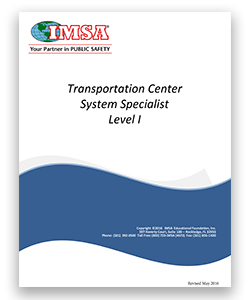
This certification program is designed for transportation professionals whose role encompasses control and operation of a road network in a Transportation Management Center (TMC). The program provides an understanding of key concepts and the technology used for devices, equipment, and software that a TMC may utilize in daily operations. It includes material on data collection, manual and automatic incident detection, telecommunications, sub-systems, video, operations and control, network topology and security, wired and wireless physical plant, computer aided dispatching and analysis/reporting.
This certification program is intended for practitioners that install, maintain equipment used in and/or directly or indirectly operate transportation management centers
Prerequisite:
None
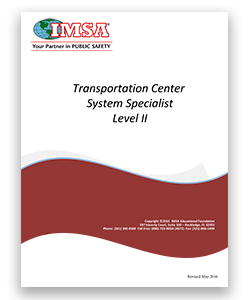
The Transportation Center System Specialist (TCSS) Level II certification program continues and expands on the knowledge and skill sets gained in the Level I program with an advanced review of the concepts, technology and operational techniques. for devices, equipment, and software that a TMC may utilize in daily operations. This program emphasizes material on data collection, vehicle detection, data integrity and integration, Center-To-Center protocols, TMC consoles, video and closed circuit television technologies, stand by power systems, software sub-systems, dynamic message signs, field device operations and system administration and troubleshooting.
This certification program is intended for individuals that have achieved the Transportation Center System Specialist Level I certification whose role and responsibilities may require a higher level of knowledge and be more supervisory.
Prerequisite:
Transportation Center System Specialist Level I.
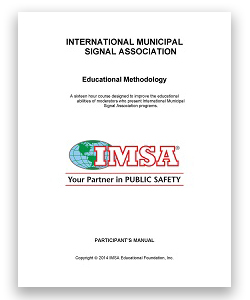
This manual was designed to assist IMSA moderators with their course presentations. You will review:
Copyright April 2014
Prerequisites:
None
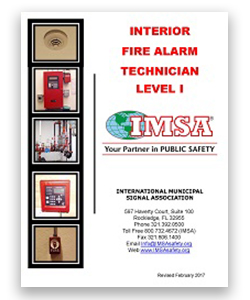
The Associate Interior Fire Alarm Technician Level I program consists of a series of four courses, each followed by a short, multiple choice quiz (Unit Examination). Each course is designed to assist you in furthering your personal and professional growth, as well as contributing to your organizational needs and that of your community.
Through the Associate Interior Fire Alarm Technician Level I courses, you will review the basics that are really required in your job for that personal and professional growth you desire. Through this program, you will be better prepared to lower the risks of accidents and injuries, further the development of professionalism in the industry, promote the need for Public Safety, and be better prepared to face the next level in the IMSA Fire Alarm Certification Program.
The study guide includes sections on:
Prerequisites:
One year of relevant work experience
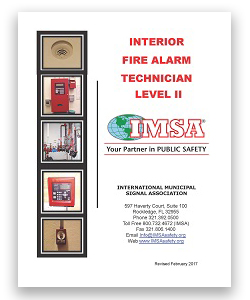
The Interior Fire Alarm Technician Level II study guide consists of a series of four sections, each followed by a short multiple choice quiz (unit examination). The study guide provides space for random note taking with enlarged margins and space at the top and bottom of each page.
The study guide includes sections on:
Prerequisites:
IMSA Interior Fire Alarm Technician Level I Certification
Two years of relevant work experience
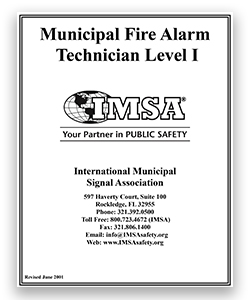
This course will review the basics of municipal fire alarm systems.
The procedures of specific state and local agencies may vary from those presented in this program. It is highly recommended that each participant become familiar with the practices of their own agency that has jurisdiction in your area.
This program reviews the fundamentals of :
Prerequisites:
None
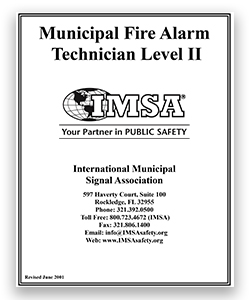
This course is designed to help further your growth in the fire alarm profession and enhance your ability to contribute to your organizational and community needs.
The procedures of specific state and local agencies may vary from those presented in this program. It is highly recommended that each participant become familiar with the practices of their own applicable agency that has jurisdiction in your area.
This program reviews the fundamentals of :
Prerequisites:
IMSA Municipal Fire Alarm Technician Level I Certification
Two (2) Years Experience within the Fire Alarm Field
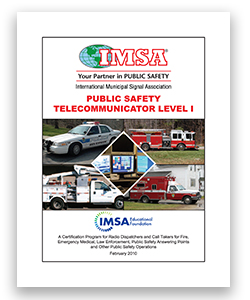
The Public Safety Telecommunicator is a critical member of the team in any Emergency Service Organization. As members of a team, the Emergency Telecommunicator and Field Response units work together to provide a service.
The Telecommunicator forms a vital link between members of the public seeking assistance and the Emergency Service that provides such assistance. For the citizen in distress, contacting the Telecommunicator is the first step in resolving an emergency situation. The action or lack of action and the attitude of the Telecommunicator often determine the perception a citizen has of an entire department. A high standard of performance is expected. Such high standards are attained as a result of pride, dedication, training and a sense of commitment.
The Public Safety Telecommunicator Level I guide contains material designed to help train Telecommunicators and call takers for fire, rescue, emergency medical, law enforcement, public safety answering points and other public safety operations.
Fiber Optic Technician for ITS, Traffic, Fire Alarm, and Communication Systems is primarily aimed at installers who need the basic knowledge, skills and abilities to install fiber optic outside plant networks properly. Others who may be interested in the course include network owners, IT personnel, facilities managers, network designers, estimators or other technicians involved in the design or installation of fiber networks. Prerequisites:
Prerequisites:
Attendees will be expected to complete an IMSA online self-study fiber optic course and get a certificate of completion to bring to class (you will get the link when you register). Some experience working in the field of fiber optics and communications networks is recommended.
Would you like to request a new program or suggest modifications to an existing program?
Download and submit this form to cert@imsasafety.org: